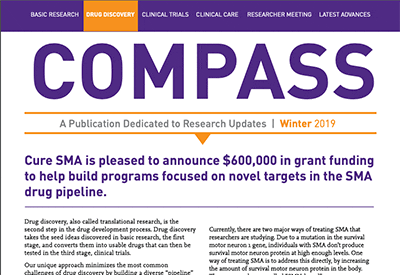Over the past fiscal year—from July 1, 2016, to June 30, 2017—Cure SMA has funded over $2.5 million in new research funding. This funding will be used strategically to help accelerate research, and ensure we are developing treatments for all types, ages, and stages of SMA. The areas funded include:
- Basic research, with a particular focus on funding approaches to develop combination therapies.
- Drug discovery, to convert basic research ideas into practical new drug candidates.
- Clinical and regulatory research, to facilitate clinical trials for all types and stages of SMA, and to guide safe and effective drug candidates toward regulatory approval.
- Clinical care, to understand issues like breathing and nutrition that impact current quality of life for those affected by SMA.
- 21st Annual SMA Researcher Meeting, to bring together the leading SMA scientists, clinicians, and drug developer together to develop SMA research strategies.
If you missed any of our funding announcements, catch up on them in our news section at www.cureSMA.org/news. Each announcement includes a profile of the researcher who is receiving the grant, and explains more about their projects and how they might benefit the SMA community.
Basic Research
Over $1 Million in New Funding in FY17:
- Arthur Burghes, PhD, for Identification of SMA modifiers and deletion/duplication junctions in the SMA region
- Jocelyn Côté, PhD, for Investigating the Mechanism by Which SMN Regulates Translation: Identification of Novel Therapeutic Targets
- Christine DiDonato, PhD, for Skeletal muscle activators as potential modulators of muscular weakness in SMA
- Oliver Gruss, PhD, and Utz Fischer, PhD, for Regulatory cues modulating the activity of SMN in human cells
- Alberto Kornblihtt, PhD, for Epigenetics in SMN2 E7 Alternative Splicing
- Jean Giacomotto, PhD, for Zebrafish models of Spinal Muscular Atrophy optimized for chemical genetics and drug discovery. From proof-of-principle to new insights and treatments
- Chris Lorson, PhD, for Examining the role of astrocytes and the influence upon lower motor neuron susceptibility in SMA
- Yong-Chao Ma, PhD, for Regulation of Motor Neuron Defects by Cdk5 Signaling in SMA
- Stephen J Kolb, MD, PhD, for Arrested Development or Neurodegeneration? An approach to understand developmental motor neuron pathology in SMA
- Remy Bordonne, PhD, for Skeletal muscle activators as potential modulators of muscular weakness in SMA
Eight Ongoing Projects:
- Christine Beattie, PhD, Identification of SMN:HuD bound RNAs critical for motor neuron development, Ohio State University, Ohio
- Arthur Burghes, PhD, Defining the contribution of RNP assembly pathways to the SMA phenotype, Ohio State University, Ohio
- Christine DiDonato, PhD, Assessing mediators of muscle weakness in SMA mice, Lurie’s Children’s Hospital, Illinois
- Rashmi Kothary, PhD, Muscle satellite cell biology and muscle regeneration in Smn-depleted mice, OHRI, Ottawa, Canada
- Antoine Clery, PhD, Novel approaches against spinal muscular atrophy by targeting splicing regulators, ZHR, Switzerland
- Charlotte Sumner, MD, Assessing the reversibility of proximal axon abnormalities in SMA mice, Johns Hopkins University, Maryland,
- Megerditch Kiledjian, PhD, Novel Strategies to Increase SMN2 RNA Rutgers, The State University of New Jersey, New Jeremy
- The Development of a Clinically Relevant Outcome Measure for SMA Therapeutic Trials, Chad Heatwole, MD, University of Rochester, New York Satiate
Drug Discovery
Four Ongoing Projects:
- Preclinical development of a JNK drug candidate to alter disease progression in SMA to Charlotte Sumner, MD, Johns Hopkins Hospital and Imago Pharmaceuticals, Maryland
- Slowing SMN degradation to treat SMA to Barrington Burnett, PhD, Uniformed Services University, Maryland
- Pharmacological inhibition of p38αMAPK as a candidate therapeutic approach for SMA to Livio Pellizzoni, PhD, Columbia University, New York,
- Development of a drug to increase SMN2 transcription to Kevin Hodgetts, PhD, Brigham and Women’s Hospital, Massachusetts
Clinical and Regulatory Research
As more SMA drug programs progress through clinical trials, there is an increasing need for us to address clinical and regulatory issues and bring the patient voice into the process. Funding for this area will be directed toward several critical projects:
- Regulatory issues in SMA drug development including a Patient Focused Drug Development Meeting with the FDA on 4/18 to help define clinical meaningfulness and risk/benefit
- Increasing clinical trial site capacity, but standardizing training and trial protocols
- Educating and engaging physicians, caregivers and patients to decrease time to SMA diagnosis
- Nominating SMA to the Federal Recommended Uniform Screening Panel for newborn screening
In 2016-2017, we launched a collaborative industry consortium. Through this group, seven companies working in SMA drug development are working together on these projects to benefit our community.
Clinical Care
A portion of our clinical care funding for this year will be used to create a database that will demonstrate the impact of SMA over time. The increased funding will also be used to help develop centers of excellence for SMA. Information from multiple SMA care centers will be used to create evidence regarding the best care for all those affected by SMA.



